#nobusuke tagomi
Explore tagged Tumblr posts
Text








#HAPPY 10 YEARS ANNIVERSARY THE MAN IN THE HIGH CASTLE (January 15, 2015)
#the man in the high castle#high castle#juliana crain#joe blake#john smith#inspector kido#nobusuke tagomi#OH DEAR GOD#10 YEARS!#I missed making gifs on this show!
74 notes
·
View notes
Text
The Beauty of The Man in the High Castle
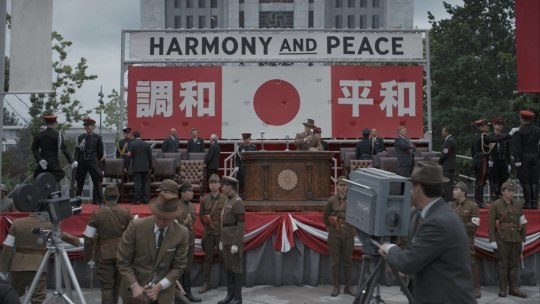

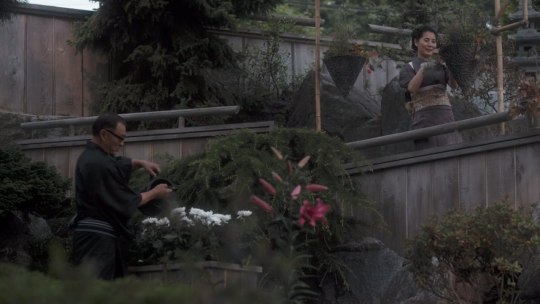



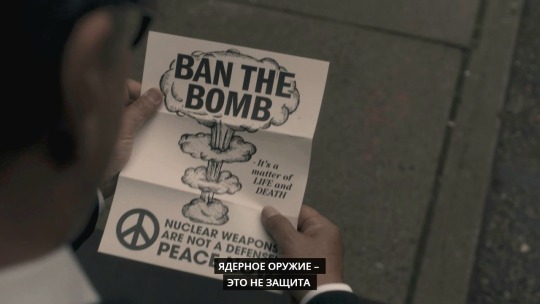
"NUCLEAR WEAPONS ARE NOT A DEFENSE!"
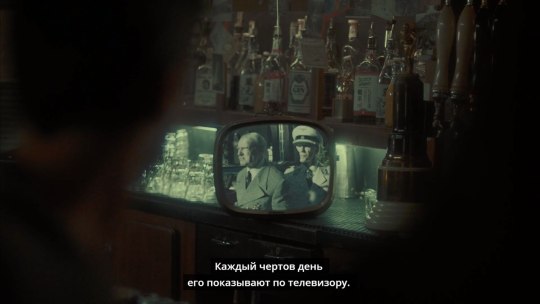
"Every damn day he’s on TV."
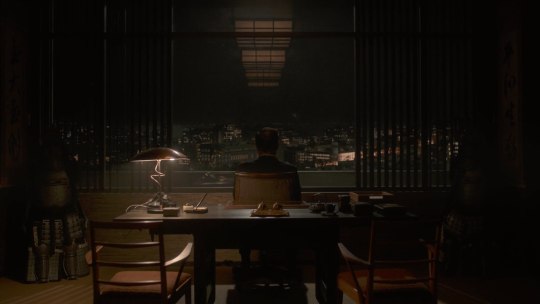
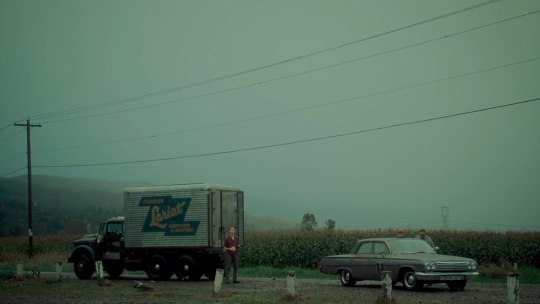
#Cary-Hiroyuki Tagawa#from evil sorcerer Shang Tsung to trade minister Nobusuke Tagomi#nobusuke tagomi#TAGOMI IS SO KIND AND SWEET I CAN'T--#tmithc#the man in the high castle#my screenshots#juliana crain#joe blake#joseph blake#tv shows
68 notes
·
View notes
Text










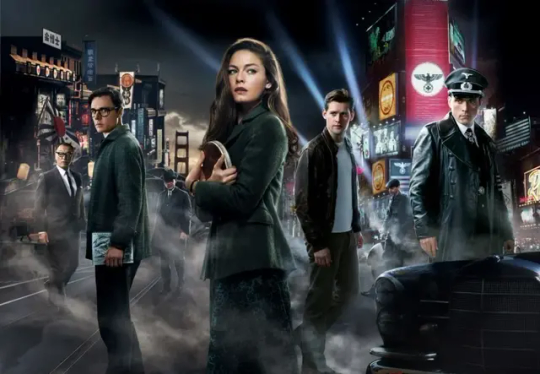
The Man in the High Castle - Amazon Prime Video - January 15, 2015 - November 15, 2019
Science Fiction Drama (40 episodes)
Running Time: 45 - 70 minutes
Stars:
Alexa Davalos as Juliana Crain
Rupert Evans as Frank Frink (seasons 1–3)
Luke Kleintank as Joe Blake (seasons 1–3)
DJ Qualls as Ed McCarthy (seasons 1–3)
Joel de la Fuente as Chief Inspector Takeshi Kido
Cary-Hiroyuki Tagawa as Nobusuke Tagomi (seasons 1–3)
Rufus Sewell as John Smith
Brennan Brown as Robert Childan (seasons 2–4; recurring season 1)
Callum Keith Rennie as Gary Connell (season 2)
Bella Heathcote as Nicole Dörmer (seasons 2–3)
Chelah Horsdal as Helen Smith (season 3–4; recurring seasons 1–2)
Michael Gaston as Mark Sampson (season 3; recurring season 1; guest season 2)
Jason O'Mara as Wyatt Price, also known as Liam (season 3–4)
Frances Turner as Bell Mallory (season 4)
A complete list of cast members
#The Man in the High Castle#TV#Amazon Prime Video#Science Fiction#Drama#2000's#Alexa Davalos#Rupert Evans#Luke Kleintank#D J Qualls#Joel de la Fuente#Jason O'Mara#Brennan Brown#Chelah Hordal#Francis Turner#Rufus Sewell
19 notes
·
View notes
Photo







The Man in the High Castle S04E01 “Hexagram 64″
#The Man in the High Castle#Hexagram 64#Juliana Crain#Alexa Davalos#Nobusuke Tagomi#GIF#my gifs#my edits#S04E01 Hexagram 64#I Ching#Danny watches The Man in the High Castle#Hide and Queue#themaninthehighcastleedit
92 notes
·
View notes
Photo

Bloshom of snow
In Japanese culture, the white chrysanthemum (kiku) is a funereal flower. Chrysanthemums feature a Fibonacci spiral, like the notion of inevitability revealed in the I Ching. Deep importance is ascribed to the reflection surrounding death and mourning; the spirits of the dead protect the living, as Juliana's sister, alive or dead, sustains and motivates her throughout this story.
Buddhist monks brought the chrysanthemum to Japan in 400 AD, and a soft Buddhism overlays the darkness of Shintoism that Trade Minister Tagomi practices.
#The Man in the High Castle#Truth#Juliana Crain#Nobusuke Tagomi#There's an edelweiss tangent here too
4 notes
·
View notes
Text

Obergruppenfuhrer Smith !
#the man in the high castle#obergruppana#john smith#juliana crain#takeshi kido#nobusuke tagomi#joe blake#reichstag#frank frink#resistencia#amazon prime
25 notes
·
View notes
Text
The Man In The High Castle Conclusion
It has been a few days since I finished the final season of TMITHC and I have many thoughts of my own and from what I’ve gathered from fans’ posts on here.
The Ending
Well, it was an ending... Honestly talking mainly about the final episode, I was already curious how they would handle it and I hoped they would extend the episode to an 1hr and a half but no such luck. Consensus gathered from here is that most people agree that they left the show in an acceptable but strange place and one more episode or even season would be needed to truly conclude every story so we know where our characters end up. Especially in regards to the large crowds of people coming through the portal which I am very glad I’m not the only one who was very confused by what that meant and still would like an explanation.
The Fallen
Now, this section may come from favourite character bias but there is a lot of truth here, I’m focusing on the deaths of Tagomi and Joe. Firstly in regards to Joe, he obviously died in season 3 and many (like myself) hoped he would return as an alternate version in S4, we didn’t get him which was a shame but fine nonetheless. What isn’t fine to me however, is that Juliana did not address Joe’s death or seem to express any emotion in regards to killing him other than a quick cigarette/alcohol scene at the start of 3x06. Like I get it, there are more important things going on but, with the emphasis put on Joe in season 3, I was surprised at the no mention besides a hint of a flashback in the mine in 4x10.
Onto Tagomi, I have to say and thankfully I have seen that many agree with me, that killing him in the first ten minutes of the season was not the best idea. All I have been able to find through searching is a comment that Cary-Hiroyuki Tagawa may have been too busy shooting a film to be in the final season, to which I say fine, I would love if that was confirmed and not just speculation though. Because, then it just seems that killing Tagomi was the plan from the get-go and I just cannot understand it. He could have had so much use in this season as a member of the empire, as someone who wanted peace overall AND most importantly as an experienced traveller. All the focus on killing Joe to save Tagomi’s life in season 3 just to kill him in the opening of season 4, sigh.
The Forgotten
Characters like Ed, Jack, Juliana’s Parents, Nicole and many more who I’ve even forgotten whose stories ended without any sort of answer as to what happened to them. Some parts of this I understand as it is the final season and there is already so much to deal with but seeing Childans arc which I adored come to a sweet end I wonder about the other characters who altogether disappeared alongside the main character they were mainly attached to (Frank, Joe, etc). The only conclusion I come up with is ‘I guess they died in the one year time jump OR they moved far away from the action’ and that is all we get.
Overall, in my opinion season four was fine, I’m satisfied enough with where they left the show but I do wish they spent some time in episodes differently or paced it so it moved more quickly. I feel like we could have gotten to the plot of the final episode by 4x08 and then we would have had two episodes to wrap up threads like if the reich and BCR come to peace terms or how are Jennifer and Amy going to cope without their parents or is there a ripple effect outside of North America? Who knows the possibilities could have been endless. Also just seeing characters get their endings would have been nice, let me see Childan and Yukiko meet in Japan, let me see Bell finally build that house she wanted, let me see Juliana be happy and content with the war over.
I’m going to miss The Man In The High Castle a lot.
#long post#the man in the high castle#tmithc#season 4#it is the end#juliana crain#john smith#joe blake#helen smith#robert childan#inspector kido#nobusuke tagomi#jennifer smith#bell mallory
15 notes
·
View notes
Photo

NO FUNCIONO: La muerte de Tagomi y la desaparición de personajes secundarios
Ya en la tercera temporada se fue reduciendo el rol de Nobusuke Tagomi (Cary-Hiroyuki Tagawa) para darle prioridad a la ciencia ficción, pero nadie esperaba que el actor no apareciera en la última temporada y su personaje tuviera un final tan abrupto al ser asesinado en un atentado elaborado por su propio gobierno. La serie se beneficiaba al contar con personaje tan especial y espiritual como Tagomi ya que antes de las explicaciones científicas era él quien explicaba la conexión entre los mundos. En la temporada final, también desaparecen por completo Ed McCarthy (DJ Qualls), Nicole Domer (Bella Heathcote) y Thlema Harris (Laura Mennell). Se puede concluir por lo menos para Domer y Harris las cosas no terminaron bien ya que fueron arrestadas por estar en club privado. Es probable que los nazis aniquilaran a Thelma mientras que Nicole fue enviada a “reeducarse”. Por su lado, vamos a imaginar que por lo menos Ed se quedó feliz con su vaquero.
#TheManintheHighCastle: ¿Qué funcionó y qué no funcionó de la serie?
#Nobusuke Tagomi#Cary-Hiroyuki Tagawa#Ed McCarthy#DJ Qualls#Nicole Domer#Bella Heathcote#Thlema Harris#Laura Mennell#El hombre del Castillo#The Man in The High Castle
2 notes
·
View notes
Photo



THE MAN IN THE HIGH CASTLE | father & son
#the man in the high castle#john smith#thomas smith#nobusuke tagomi#inspector kido#toru kido#season 2#season 4#gif
159 notes
·
View notes
Text
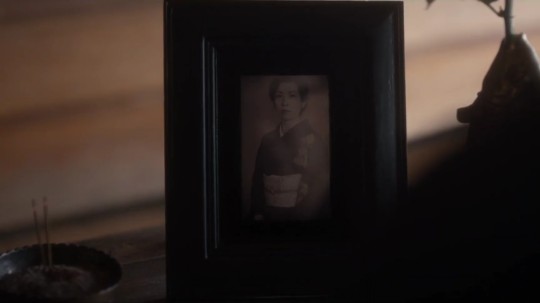


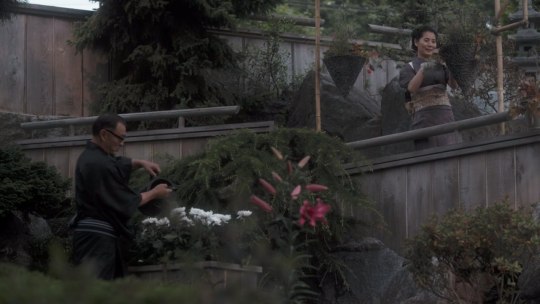

"Tagomi-san, I admire your magical flowers"

"I wish I knew your secret."
What if there is at least one timeline, where Shang Tsung isn't a slimy salesman or a sorcerer, who always gets his ass kicked, and just a man, who lives his best life with his beautiful wife and grows his own garden? I mean, Cary-Hiroyuki Tagawa is very good in this role 👀
35 notes
·
View notes
Text
The Man in the High Castle - Character Bios from Amazon’s X-ray feature - requested by anonymous
John Smith
John Smith was born in Manhattan in 1917, the second son of a prosperous Wall Street Banker. In many ways, John's early life looked picture perfect. Any hint of superiority, however, was tempered by his father, who instilled a deep sense of civic duty and propriety in his sons. The boys were four years apart in age. John looked up to older brother Chris, a star athlete and an A-student, following in suit. In 1927, when John was 11, Chris collapsed and was soon wheelchair bound. In March, 1929, The Wall Street Crash struck, and overnight American banking institutions folded. John's father was financially ruined and promptly took his own life. And so, at 13 years old, John Smith swore to himself that he would never allow himself to break. Even when his beloved brother passed away, two years later, John Smith pressed on. Despite witnessing a New York City that had become decrepit and corrupt, and a failing America that had been gutted once more by the 1933 assassination of President Franklin D. Roosevelt, John was still determined and still a patriot. He earned a degree at Princeton, he joined the New York Mayor's office, implementing programs to get America back to work, and, when war loomed, he signed up for officer training at West Point. where he proved a natural solder and tactician. Graduating to a post within the US Signal Corps. By 1942. John Smith was a 1st Lieutenant. In 1943, he was promoted to Captain and re-deployed to the Pentagon to advise all branches of the military on intelligence gathering. During this time, he met and married Helen McCrae, the beautiful, accomplished daughter of two Harvard academics. Helen became pregnant with their first child in July, 1945. Just a few months later, the American government fell to the New Reich. Smith saw surrender as the right thing to do. America had lost. Nothing in the US arsenal could compete with Nazi nuclear power. So, John Smith assimilated into the interim government, in sincere hope he could lessen the brutality of Nazi retaliation against rebel uprisings. He could save American lives. He could keep those he loved safe. Nazism is survival.
Wyatt Price
Wyatt Price is the alias of an Irishman who fled Nazi Europe in 1944 to seek refuge in unconquered North America. Though Ireland had remained neutral at the outset of The War, large numbers of Irishmen had been called to fight and more took to the front after nearly 400000 British soldiers were killed or otherwise defeated at the beachhead in Dunkirk, France in 1940. In September of that year, British Prime Minister Winston Churchill was killed in a German air raid, and the war raged on. Young Liam had been away from home for a year, fighting for the British Army. In January, 1942, the British Government fell to the Reich. England was occupied, but fierce resistance continued in Wales and Scotland for two more years. In 1944, the remnants of the British Isles were finally conquered. When Ireland capitulated to German rule, Irish men and women left the mainland In droves, pushing off the coasts by night, bound for the Americas. Young Liam was among those who fled. In America, Liam became Wyatt Price. He had seen his fair share of horrors back in Europe. He had lost almost his entire family, and wanted to start anew. But war was encroaching on North America as well, and in 1945 Germany took the continent, dropping the A-Bomb on the capital. For two years, Wyatt fought in the Rebel American War. By 1947, badly beaten, and starved of resources, the resistance was forced underground. Wyatt's surviving network spread out. Some military comrades stayed on the East Coast in the Greater Nazi Reich, while others dispersed to the Neutral Zone in the former American heartland, where 'freedom' became simply another word for ‘lawlessness’. It was in this wild, neutral territory that Wyatt established himself. He became known as a shrewd, resourceful fixer. He was depended on by many, but trusted no one. He never spoke of the past, he never told anyone his real name. He shrouded himself in secrecy and misinformation. He could smuggle anything, obtain official-looking documents; it was impossible to know whose side he was on. And Wyatt liked it that way. It was the best way to stay alive while doing so-called dirty work. He had long abandoned the fight for liberty and justice in this world. He resigned himself to mating for justice in the next one.
Juliana Crain
Juliana has a tendency for deep introspection and even depression - a result of her father's death, which cast a shadow over her life. She was 10 and her sister Trudy nearly 3 when the A bomb fell on Washington, D.C. Within days, the American government had surrendered. Intense resistance followed and life became hard for white Californians. The Japanese occupation was brutally enforced. White people were denied ownership of major businesses. Anyone not bowing to a Japanese citizen in the street was shot dead. By the time Juliana completed high school, the San Francisco where she was born was unrecognizable. But, despite the horrors, many things about Japanese culture fascinated Juliana - its orderliness, beauty, food, and subtle philosophy. She persuaded a Japanese Dojo to take her on as an Aikido student and found she had a talent for the martial art and its focus on energy, poise, and balance. Nevertheless, the atmosphere of oppression and obedience in the JPS was draining. Over the years Juliana's depressions deepened until, one day, she stepped in front of a bus, determined to set herself free. Death, however, was not In store for Juliana Crain. Instead, she found herself injured and in the arms of a young passerby, Frank Fink. Over the course of her recovery, the two established a strong bond that became a deep love. But as she began to settle into a life with Frank, a restless searching began to rise once more within her. On the night she witnessed her sister Trudy's execution at the hands of the Kempeitai, Juliana Crain stepped once more into the unknown, this time to answer the call of a transcendent force, somewhat akin to destiny.
Takeshi Kido
Takeshi Kido was born in 1917 in the town of Koriyama, Japan. The son of a tenant farmer, Kido was the fourth of eight children. Theirs was a hard life with no prospects for improvement, of backbreaking work, and unpredictable, often swift, death. In 1930, a 13-year-old Kido took the intelligence test given to 15-year-old prospective students for the Japanese Intelligence Service and scored off the charts. In 1932, he ran away from home to join the Army and was recruited into the Kempeitai — the highly respected Japanese military police and intelligence force. Kido excelled not just because of intellect but because of his strength of will and unyielding sense of patriotic duty. His drive to succeed was unmatched. Orders that might give others pause had no effect on the young officer. Kid0 was serving in Manchuria when the Japanese army invades deeper into China in 1937. The infamous Rape of Nanking occurred during this campaign, and Kido was confronted with a level of brutality he had never before imagined. Such horrors left an indelible mark on him. In the intervening years, Kido became a seasoned officer, serving honorably across many bloody campaigns. He witnessed many horrors including the Rape of Nanking and, later, the carnage of the Solomon Islands offensives, which claimed the lives of many American and Japanese troops. Having risen In the Japanese societal hierarchy, Kido took a wife in 1950. He would father two children with his bride, but the family was divided by Kido's duty to the Empire. Kido took up a post in the Japanese Pacific States of America in 1952. In 1957, he was promoted to Chief Inspector of the Kempeitai, one of the most senior positions in the JPS, and by 1962, the year he shot and killed a young rebel by the name of Trudy Walker, Kido had spent five years crushing American resistance firmly under his boot and almost seventeen years away from mainland Japan, a place he would never again call home.
Joe Blake
Joe believed he was born in Brooklyn in 1938, the single child of a single, German mother who claimed Joe's German father abandoned them before he was born. When the A-bomb dropped on Washington. D.C. the Nazis assumed power, and, by 1950, the American Reich was firmly established. But young Joe Blake was never totally certain who he was or what he wanted to be. He still wanted to hide his mother's German-ness. Most of all, he never felt worthy of an absent father's love. This confusion and shame came out in a rebellious streak. Joe stole a car at age 15 and, at the police station, he heard his mother tell a desk sergeant about what an important man his father was, back in Berlin. Later that day, he received a visitor - a GNR colonel named John Smith, who offered him a ride home. Joe's run In with Smith helped him turn a corner. He got an apprenticeship in construction, did a year of mandatory military service and signed up to the Corps of Engineers. He was a charming young than who kept intimacies at a distance. He did honest work for an honest Mark. His mother died of Septicemia when he was 21 years old, and Joe buried his grief along with her. That muted sadness turned into a silent rage at their poverty, at their abandonment by his father, a man he longed to have known. Two years later, John Smith - now Obergruppenführer - re-appeared In Joe's life. Smith had a Job for him if he was willing to commit. Joe didn't care about the Reich or duty to his country but Smith fascinated Joe and so did the prospect of finding out more about his elusive father. Joe agreed to Smith's terms for he had nothing to lose.
Nicole Dörmer
Nicole was born to a pretty, young ward of the Lebensborn nursery where every aspect of her upbringing was designed to indoctrinate her and her Lebensborn fellows. One of Nicole’s earliest memories was a visit by Himmler to the orphanage. Nicole was only four and already a starling beauty. She as chosen to hand Himmler a bouquet and sing a patriotic song. Himmler raised her in his arms and kissed her cheeks, telling Nicole that he was her father. Then, in the spring of 1944, Otto Dörmer, Nicole’s real, biological father arrived. Young Nicole was taken to Dörmer’s grand family home in Potsdam, where she had the run of the mansion. By 1944, the Lebensborn program was being phased out by the Reich; thusly, its products were becoming more and more valuable. Private schools vied for the privilege of taking Nicole and her comrades. With their privileged status, the Lebensborn children often found they could get away with behaviors or attitudes that would have placed other citizens in danger. They illicitly collected Jazz, read banned books, and made mildly critical observations of about the state. But despite this rebelliousness, they were proud believers in the clear superiority of the Nazi regime. Nicole traveled the world before college. She dined at all the fashionable restaurants and attended all the best parties, plays and film galas. Fascinated by the media as an instrument of State Control, she enrolled at the Brandenburg Studios Propaganda Arts course and dropped out after four semesters, bored by the conventionalism. She experimented with LSD and had liaisons with both men and women in an attempt to free herself from conventional norms. In 1960, at age 21, Nicole was expected to find a husband, but she wanted a career, she wanted to be noticed, and she wanted to make a difference. Later that year, she was arrested under suspicion of publishing a seditious pamphlet. Upon release, she was cowed but far from broken. It was a wake-up call that she was not immune from harm and that she shouldn't be foolishly outspoken. But in other ways, it made her even more determined to challenge the received wisdom of the "fossils" in power.
Robert Childan
Robert Childan was born in San Francisco in 1919. He was an only child and the apple of his mother's eye. Robert's father was a stern and emotionally closed man who ran a kitchen and housewares business. Robert was 10 when the Great Depression hit and his father's enterprise went bust. The family moved into a small downtown San Francisco apartment and lived in the midst of Mrs. Childan's sprawling book collection. After college, Robert got a junior curator position at the San Francisco Museum of Art and managed to avoid going to war after a mild cardiac arrhythmia was detected during his medical examination. In 1942, Robert's father died, and, in 1945, his mother passed away too, just before the Germans dropped the A-bomb. As Japan began its occupation of San Francisco, Robert realized he'd need to adapt quickly or he'd likely wind up dead or arrested. His resourcefulness ultimately led him to the idea of starting a bookstore using his mother's collection as initial inventory. The white-collar jobs Robert was suited for were not open to him in the San Francisco of the JPS, but Japanese hunger for Americana and curiosity about American literature was taking hold all over the city. He knew he could exploit this. Robert began to buy up old heirlooms and American antiques. Very soon sales of American object's d'art outstripped book sales. His livelihood depended upon a growing Japanese client base. Over the years, he grew to admire the distinctive and aloof cultural superiority of his patrons and envied their grace and beauty. He was becoming part of a new class of 'Nippophile' aesthetes, an inevitable side effect of Japan's cultural imperialism in California. But, deep down, Robert resented those he seemed to adore.
Edward McCarthy
Edward was born in Oakland in 1934 to proud second-generation Irish Americans. His father had grown up in the Bay area, inheriting a small metalworking factory from Ed's grandfather. After his family moved into a modest townhouse near the factory, Ed met and quickly befriended his neighbor, Frank Frink. The war with Japan began in April 1941 and many factory workers signed up, leaving wives and daughters to keep factory production lines moving. Ed spent a lot of time there; he loved the smell, sound and vitality. In July 1944, when Ed and Frank were 10 years old, the war with Japan arrived on America's doorstep. Planes swooped down on San Francisco to unleash their bombs. The family survived the raid, but later that year, the Japanese dropped Chlorine explosives on the city, leaving Ed poisoned and on the edge of dying. Ed's mother perished in the attack. At the hospital, Ed spent many hours alone, in pain and in fear. With this isolation and suffering came an extraordinary strength of resilience to endure. And though he did not recognize it as a boy, he felt a deep love towards Frank who came to visit him every day for months. It was a bond of affection that would be a guiding light for the rest of his life. By 1946, Ed would need this kinship for survival. The Bomb had been dropped on Washington, the factory had been taken over by the Japanese, and Ed's father had been dragged into the factory courtyard, forced to his knees and shot in front of all the workers; Ed went to live with his grandparents. Churches closed, St. Patrick's Day was banned, and San Francisco filled with waifs and strays fleeing the Nazis in the East and migrant workers from the Japanese Empire in Asia. But Ed never hated the Japanese; he hated war and violence and brutality. Ed's deepest reaction to loss was always to love. This was his gift.
Frank Frink
Frank was born in 1934, his older sister had been born two years earlier. After the Japanese attacked Pearl Harbor in April, 1941, Frank and his sister went to live with their grandmother. They worked jobs after school, cooked, cleaned and helped to pay the bills with what meager funds they could scrape together. Their father died on the front lines in 1943, fighting the Japanese, and five years later, their mother passed away too. It was around this time that Frank's best friend's father was shot dead in the courtyard of his metalworking factory by Japanese occupiers who had come to take over. Frank and his friend, Ed, were bonded in unspoken shared pain. At age 16, Frank got a job at the factory where he helped craft handguns for the Japanese market. Frank's first passion had always been art; drawing and painting had been a way for his mind to escape. Unfortunately, there was little appreciation or legitimate outlet for Frank's gifts. One morning, on the way to the factory, Frank was shocked to see a beautiful young woman purposely step into the street in front of an oncoming bus. It was Juliana Crain. The two moved in together shortly after Juliana got out of hospital and began a life together. They were happy, for a time. But, as much as Frank and Juliana loved each other, a series of tragedies and shocking experiences would set them on very different paths. Frank supported Juliana as she committed herself to a purpose he couldn't fully understand, making the best of a bad situation, until finally, they parted. The young artist also fell victim to the encroachment of racial purity laws on the JPS and Frank Frink, once passive and resigned, found himself consumed by hatred for the leader of the Kempeitai who cruelly and capriciously enforced the laws of the Reich.
Helen Smith
Helen was born in Boston in January 1922 to parents who were academics. Helen was being raised to think for herself and challenge conventional wisdom. After the Great Depression hit in 1929, she witnessed deep poverty and hunger in addition to the birth of a fierce political environment, which helped incite the assassination of President Roosevelt in 1933. With Stalin's rise in the Soviet Union and Hitler's imposition of Fascism in Germany, it seemed to young Helen that America was itself on the brink of totalitarian take over. And why not? If it got America working again. In 1940, Helen went to study at the prestigious NYU School of Commerce, Accounts and Finance and, in 1941, after the Japanese attacked Pearl Harbor, she dropped out to volunteer as a secretary in the New York War Office. Then, in June, 1943, Helen's life changed again. A young Captain, named John Smith, came to City Hall to set up an intelligence bureau. He and Helen became friends, then lovers. A year later, they were married in a modest ceremony, just before John left to fight in the war raging in the Pacific. Every day, Helen dreaded bad news from the front. But in 1945, Helen discovered she was pregnant; this good news was accompanied by word that her husband was to take up a permanent post at the Pentagon. The couple shipped their belongings to Washington, D.C. and drove down from New York together, stopping for the night, just outside of the city. That night, the Nazis dropped the Heisenberg device on Washington; overnight, the world changed. John Smith was a profoundly moral man who shared Helen's belief in a benevolent and supportive community. It seemed the only way towards that future would be to fully capitulate to Reich, avoiding potential nuclear annihilation. And so began Helen's embrace of the Nazi way of life. She wanted a safe world in which to raise her son, and eventually her daughters. Despite her parents' executions in 1949 at the hands of the GNR, she had made peace with the realities of Fascist America, the means and methods by which it was achieved, and was grateful for the benefits it brought her - if only for a time.
Nobusuke Tagomi
Tagomi was born in Tokyo in 1887, in the Meiji era - when Japan restored the Emperor and rapidly began to militarize and modernize. Tagomi's family was Samurai caste from the ruling elite, with close ties to the royal family. He and his younger brothers were raised from the cradle to understand that their life would be in service to the Japanese State. At age 11, Tagomi was sent away to Navy Cadet School. There he was schooled in English, French and German, served in the Japanese fleet for several years, and became a junior Naval Attaché. He soon realized his aptitude for diplomacy and negotiation was better suited to work in the Trade department and in 1916, he left the Navy for a position at the Japanese Trade Mission. Years later, in 1933, Tagomi met and wed the daughter of another elite Samurai family from Yokohama. He was 38 years old at the time. Their son, Yoshi, was born the following year, and, in many ways, this era was the happiest of Tagomi's life. Professionally, he continued to rise in stature, but clouds were gathering. Fascism in Germany, coupled with the emerging political influence of Major General Hideki Tojo, was an increasing threat. In 1939, the war in Europe began, and in 1940, Japan allied with Hitler. Tagomi became crucial to the war effort as Japan was challenged by lack of oil in its territories. He went on a series of trade missions to California to negotiate oil imports and was successful in his negotiations. The irony: US oil would fuel the conflicts that eventually defeated her. Despite much success, death was slowly closing in on Tagomi's loved ones. His brothers perished in the Pacific at the start of the war. After the family moved to San Francisco in 1947, so Tagomi could help set up a colonial administration, Yoshi joined the Japanese Imperial Army and died serving in Manchuria in 1952. Tagomi's wife returned to Tokyo, heartbroken, and succumbed to Pneumonia in 1953. Tagomi went into himself, seeking solace in meditation. There must be some purpose to this life. Some reason to the world. Could he find it, alone in San Francisco?
#the man in the high castle#tmithc#john smith#Helen Smith#Juliana Crain#joe blake#frank frink#wyatt price#inspector kido#nobusuke tagomi#nicole dörmer#ed mccarthy#robert childan
86 notes
·
View notes
Text



The Man in the High Castle
#the man in the high castle#cast#alexa davalos#juliana crain#rufus sewell#john smith#luke kleintank#joe blake#joel de la fuente#inspector kido#rupert evans#frank frink#nobusuke tagomi#my edit#the man in the high castle wallpaper#wallpaper#tv series#amazon prime#theitalianmoviegoer
92 notes
·
View notes
Photo




I started Man in the High Castle a couple years ago. 2016 to be exact. After the *events* in 2017 happened, I couldn’t stand to watch an alternate timeline where facism and nazi’s were in america. (it felt a little too real) The hubs and I finally sat down and finished season 2, and binged season 3. It’s an amazing show, and remembering that it’s fiction makes it easier to watch.
Also watching the main bad guy (top image, Obergruppenfuhrer/Reiksmarshall John Smith) slowly start to lose everyone close to him, and (hopefully) start to really doubt his choice to join the Reich is delicious to watch. I hope in season 4 he throws everyone for a loop because right now he is *very* good at sticking to his guns...at least on the outside. It’s clear there is some internal conflict going on, but on the outside he’s still pretty ice cold.
Trade Minister Tagomi (middle image) is awesome. He’s the first character we see to discover that there are multiple outcomes to WWII, and that his world is not the most ideal. Based on what he finds in a parallel world, he returns to seemingly help “fix” his own timeline. Plus, despite the fact he’s the Trade Minister of the Japanese Pacific States, he’s very centered and tries to use his power and hierarchy for peace.
(I wish his portrait didn’t look so....blegh. I’ve fixed it so many times to no avail. Ah well.)
Juliana Crain is a great character, because watching her....makes me realize what a giant fucking baby I am. She’s already faced her death, and now the only thing that seems to scare her is failing, and being alone. She’s brave, smart, compassionate, but also not afraid to do what she needs to do to preserve her ideals. She’s an underrated female lead. My only Bechdel Test Gripe is that she needs more female friends to talk to in the resistance.
Inspector Takeshi Kido. When I first started watching the series, the scariest bad guy was Smith, Kido a close second. (mostly because Nazis are inherently more scary than the Kempeitai, because we generally know more about them.) Now that season 3 is over, and we’re headed into season 4, I find Kido to be the scariest. Again, I feel, because I do not fully understand the Imperial Japanese culture from this time period. He seems ruthless, on top of his cunningness. Sure, we see a little bit of his softer side, but it seems like a drop in the bucket compared to what he’s willing to do in the name of honor of his country.
#Man In The High castle#john smith#obergruppenfuhrer smith#Rufus Sewell#nobusuke tagomi#trade minister tagomi#cary-hiroyuki tagawa#Juliana Crain#Alexa Davalos#Takeshi Kido#chief inspector kido#kido#joel de la fuente
83 notes
·
View notes
Photo




#Always fun reading your own file#The Man in the High Castle#History Ends#S03E06 History Ends#Nobusuke Tagomi#Cary Hiroyuki Tagawa#Danny watches The Man in the High Castle
26 notes
·
View notes
Text


#the man in the high castle#tmithc#fanvid#fan edit#will post in a bit#if nothing goes wrong#🤞#john smith#Juliana Crain#wyatt price#liam#joe blake#inspector kido#Helen Smith#nobusuke tagomi#bell mallory#frank frink
4 notes
·
View notes
Photo

The Man in the High Castle
Season 3, “Baku“
Director: Deborah Chow
DoP: James Hawkinson
#The Man in the High Castle#Baku#The Man in the High Castle S03E09#Season 3#Deborah Chow#James Hawkinson#Cary-Hiroyuki Tagawa#Nobusuke Tagomi#Rufus Sewell#John Smith#Chris Collins#Chris Wu#Amazon Video#Amazon.com#Amazon Studios#Scott Free Productions#Electric Shepherd Productions#Headline Pictures#Big Light Productions#Picrow#Reunion Pictures#TV Moments#TV Series#TV Show#television#TV#TV Frames#cinematography#October 5#2018
15 notes
·
View notes